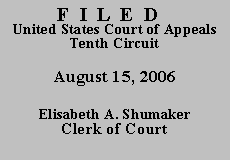

| HUBERT LINN,
v. KIOWA COUNTY DISTRICT COURT; STATE OF OKLAHOMA, |
No. 06-6164
(D.C. No. 05-CV-1514-T) |
OF APPEALABILITY
In April 1996, Linn was convicted in Oklahoma state court of two counts of Lewd Molestation, After Former Conviction of a Felony, and was sentenced to two consecutive terms of 500 years' imprisonment. His conviction was affirmed by the Oklahoma Court of Criminal Appeals ("OCCA") on July 11, 1997, and when Linn failed to seek certiorari review of the OCCA's decision, his conviction became final on October 9, 1997.
On October 26, 2004, over 7 years after his conviction was finalized, Linn filed a petition for post-conviction relief in state court. His petition was denied and the OCCA affirmed that decision. Linn then filed a habeas petition in federal court on December 28, 2005. After being provided with an opportunity to show cause as to why his petition was untimely, the district court ruled that his petition was time-barred. A subsequent application for a COA was denied. Having failed to secure a COA from that court, Linn now seeks a COA from us.(1)
The statute of limitations for applications for a writ of habeas corpus is set forth in 28 U.S.C. § 2244(d). It states:
(1) A 1-year period of limitation shall apply to an application for a writ of habeas corpus by a person in custody pursuant to the judgment of a State court. The limitation period shall run from the latest of
(A) the date on which the judgment became final by the conclusion of direct review or the expiration of the time for seeking such review;
(B) the date on which the impediment to filing an application created by State action in violation of the Constitution or laws of the United States is removed, if the applicant was prevented from filing by such State action;
(C) the date on which the constitutional right asserted was initially recognized by the Supreme Court, if the right has been newly recognized by the Supreme Court and made retroactively applicable to cases on collateral review; or
(D) the date on which the factual predicate of the claim or claims presented could have been discovered through the exercise of due diligence.
(2) The time during which a properly filed application for State post-conviction or other collateral review with respect to the pertinent judgment or claim is pending shall not be counted toward any period of limitation under this subsection.
Linn's conviction became final on October 9, 1997. Under the provisions of AEDPA, Linn had until October 9, 1998, to file a timely habeas petition. See United States v. Hurst, 322 F.3d 1256, 1261 (10th Cir. 2003). Because Linn did not file his federal habeas petition until December 28, 2005, his petition is time-barred.(2)
Linn argues that AEDPA's statute of limitations does not apply because AEDPA was enacted after his conviction. He is wrong. We have held that AEDPA's statute of limitations applies to all habeas petitions filed in federal court after its enactment, and Linn's petition, filed in December 2005, falls within its scope. Mitchell v. Gibson. 262 F.3d 1036, 1045 (10th Cir. 2001).
Linn also contends that the statute of limitations should be equitably tolled because his counsel, appointed on May 15, 1996, to handle his direct appeal in this matter, failed to keep him informed of the status of his direct appeal for the following seven years. Equitable tolling is available "when an inmate diligently pursues his claims and demonstrates that the failure to timely file was caused by extraordinary circumstances beyond his control." Marsh v. Soares, 223 F.3d 1217, 1220 (10th Cir. 2000). As noted above, Linn did not file any action for post-conviction relief in state court until seven years after his conviction became final, and his only claim as to why this delay occurred is that his attorney never responded to his letters and phone calls as he "sat and waited, but not very patiently." Such allegations do not satisfy his obligation to diligently pursue his appeal.
Accordingly, Linn's application for a COA is DENIED and the appeal is DISMISSED. Linn's motion to proceed in forma pauperis is GRANTED.
ENTERED FOR THE COURT
Carlos F Lucero
Circuit Judge
1. Linn's petition was filed after April 24, 1996, the effective date of the Antiterrorism and Effective Death Penalty Act ("AEDPA"); as a result, AEDPA's provisions apply to this case. See Rogers v. Gibson, 173 F.3d 1278, 1282 n.1 (10th Cir. 1999) (citing Lindh v. Murphy, 521 U.S. 320 (1997)). AEDPA conditions a petitioner's right to appeal a denial of habeas relief under
§ 2254 upon a grant of a COA. 28 U.S.C. § 2253(c)(2). A COA may be issued "only if the applicant has made a substantial showing of the denial of a constitutional right." § 2253(c)(2). This requires Linn to show "that reasonable jurists could debate whether (or, for that matter, agree that) the petition should have been resolved in a different manner or that the issues presented were adequate to deserve encouragement to proceed further." Slack v. McDaniel, 529 U.S. 473, 484 (2000) (quotations omitted). Because the district court denied Linn a COA, he may not appeal the district court's decision absent a grant of COA by this court.
2. Although generally the statute of limitations is tolled during the period that Linn sought relief in state court, this does not help Linn because he sought state post-conviction relief after the statute of limitations period has already expired. See Fisher v. Gibson, 262 F.3d 1135, 1142-43 (10th Cir. 2001).